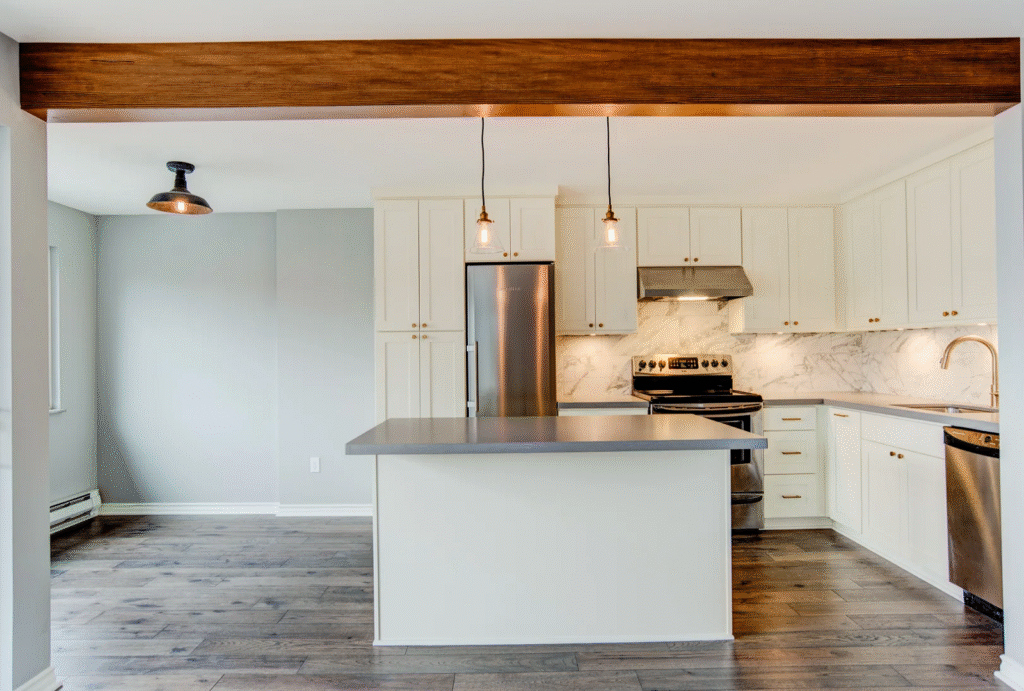Thinking about upgrading your condo? Remodeling a condo is possible—but it’s not as straightforward as renovating a house. From strict HOA rules to shared walls and city permit requirements, condo renovations require careful planning and communication. Whether you’re dreaming of a modern kitchen, new flooring, or a full unit makeover, this guide explains what you can (and can’t) do—and how to do it right.
What Is a Condo Remodel?
A condo remodel involves improving the interior of your condominium unit. This can range from cosmetic updates to major interior renovations. Unlike single-family homes, condo owners don’t have full control over every square foot—shared spaces like floors, ceilings, and exterior walls are part of the building’s “common property” and usually governed by your HOA.
Real-Life Examples of Condo Remodeling Projects
- Kitchen Overhaul in Miami, FL: A homeowner wanted to add an island and open up the kitchen. But removing a small section of wall required both HOA and structural engineer approval. The project took 3 extra weeks due to permit delays.
- Bathroom Redesign in Chicago, IL: Swapping a tub for a walk-in shower triggered city permit requirements. The condo board also requested water pressure and waterproofing evaluations.
- Flooring Update in New York City: A resident replaced carpet with hardwood floors but didn’t install a sound barrier. Neighbors below complained, leading to fines and a forced reinstallation with noise-dampening underlayment.
What You Can Usually Remodel in a Condo
Condo owners typically have control over:
- Interior walls (non-load-bearing)
- Kitchen cabinetry, countertops, and appliances
- Bathroom vanities, toilets, and fixtures
- Lighting, outlets, and switches
- Flooring (with HOA soundproofing rules)
- Paint, trim, and built-ins
Always review your HOA guidelines and consult your building management before moving forward.
What You Likely Need Approval For
Many HOAs and local jurisdictions regulate:
- Structural changes (moving or removing walls)
- Plumbing or electrical relocations
- HVAC changes
- Flooring with noise impact (like hardwood)
- Exterior doors, windows, or balconies
- Any modification that may affect shared building systems
Step-by-Step Guide to Remodeling a Condo
1. Review HOA Rules and CC&Rs
These will outline what you can change and what needs board approval. Some boards require:
- Blueprints or floorplans
- Contractor insurance documents
- Detailed scope of work
- Security deposit or remodeling fee
2. Get Necessary Permits
Depending on your city and remodel type, you may need:
- Building permits for plumbing/electrical/structural work
- Inspections post-completion
- Professional plans or engineer sign-off
Permit offices vary greatly. For example, Los Angeles and Boston require fireproofing upgrades for some projects, while smaller cities may be more flexible.
3. Hire a Condo-Savvy Contractor
Choose one who:
- Knows how to work under HOA restrictions
- Communicates well with boards and neighbors
- Has experience managing permit requirements
- Understands working in high-rise or multi-unit buildings
4. Prepare for the Logistics
- Reserve elevator and loading dock times
- Lay protective coverings in hallways
- Schedule work within allowed construction hours
- Provide neighbors and building staff with a schedule
Common Challenges During a Condo Remodel
1. Noise and Disturbances
Most HOAs only allow work during specific hours. Even then, tools like jackhammers, saws, and drills can strain neighbor relationships. Delays may occur if complaints are filed.
2. HOA Delays or Denials
Boards can deny or delay your project if:
- Your plan isn’t detailed enough
- You miss insurance documents
- Neighbors object due to noise or dust concerns
3. Permit Complexity
In cities like San Francisco or New York, getting a permit for plumbing or structural changes can take weeks—or months. Permit rejections may require redrawing plans.
4. Elevator Access Limits
If your condo has one elevator for both passengers and freight, you’ll need to reserve it, potentially pushing your timeline back if other residents are remodeling too.
5. Unexpected Costs
Condo remodels often reveal hidden problems like:
- Asbestos behind old walls
- Outdated electrical systems
- Mold or plumbing code violations
Always build in a 15–20% contingency budget.
Mistakes to Avoid
- Starting work before HOA or city approval
- Hiring general home contractors unfamiliar with condos
- Forgetting about noise or vibration limits
- Not disclosing all aspects of the remodel to your HOA
- Over-customizing if you plan to sell soon
Do You Need a Permit to Remodel a Condo?
Yes. Permits are generally needed for:
- Moving plumbing or electrical lines
- Wall removals or modifications
- Adding built-ins that connect to common walls
- Changing HVAC systems or water heaters
- Replacing windows or doors in some cases
Your city’s building department website typically lists permit requirements and costs.
How Much Does It Cost to Remodel a Condo?
| Project | Average Cost (U.S.) |
| Kitchen remodel | $15,000 – $40,000 |
| Bathroom remodel | $10,000 – $25,000 |
| Full interior remodel | $50,000 – $150,000+ |
| Flooring replacement | $4,000 – $15,000 |
Factors that influence cost:
- Location (urban vs suburban)
- Type of finishes used
- Size of the unit
- Permits and inspection fees
- HOA-related costs (deposits, fees, insurance)
FAQs
Can I knock down a wall in my condo?
Only if it’s non-structural and approved by your HOA and building management. Structural walls often require engineering review and may be off-limits.
Can I install hardwood floors?
Yes—but most HOAs require a sound-dampening underlayment to reduce footstep noise for neighbors below.
Do I need insurance to remodel?
Yes. Many HOAs require liability insurance coverage from both the contractor and you, the homeowner.
What if my neighbor complains?
You may face project delays or be forced to stop work. Open communication and advance notice help reduce friction.
How long will the project take?
It varies. Minor updates may take 2–3 weeks. Full remodels, including permits and inspections, can take 2–6 months.
Final Thoughts
Yes, you can remodel a condo—but it’s a project that demands extra planning, clear approvals, and respect for shared living spaces. From understanding what’s possible to anticipating roadblocks, a condo remodel can go smoothly with the right knowledge and preparation. Make sure to partner with experienced professionals and always follow your HOA and city rules.






